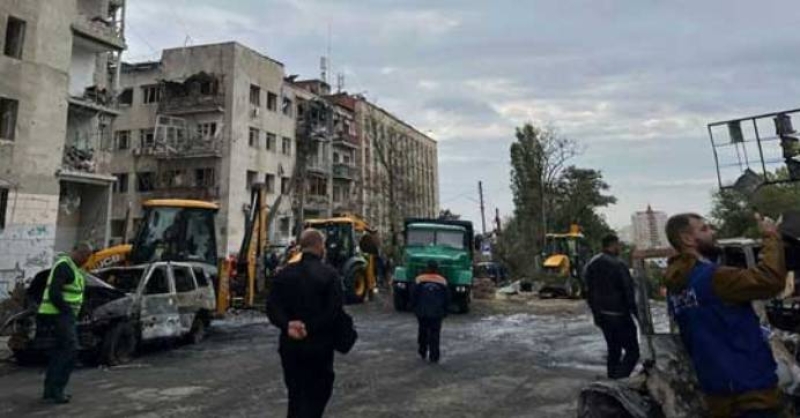- US Supreme Court Voids Donald Trump Global Tariffs |
- India looks forward to engaging with new govt in Bangladesh |
- No more running after doctors, services to reach doorsteps |
- ‘Revolutionary’ shift in economy, stock market soon: Amir Khashru |
- Stocks end week sharply lower as DSE, CSE indices tumble |
Nuclear Coercion: Dangerous and Illegal

Aftermath of attack in the city center of Kharkiv, Ukraine. June 2024. Credit- IOM
By Andrew Lichterman, Alyn Ware and Yosuke Watanabe
OAKLAND, California / PRAGUE, Czech Republic / YOKOHAMA, Japan, Jun 28 2024 (IPS) - Our three organizations– Western States Legal Foundation, Peace Depot, and Basel Peace Office– all dedicated to the elimination of nuclear weapons, have consistently expressed our concern about the risk of nuclear war escalating during armed conflicts and times of high tension, when nuclear-armed states often make veiled or even explicit threats to use nuclear weapons and prepare for such use.
This has happened, for example, with the governments of India and Pakistan trading nuclear threats during their 2001 stand-off, the U.S. government making veiled nuclear threats against Iraq in 1991 and 2003, and the U.S. and North Korean leaders threatening to strike each other with nuclear weapons in 2017.
We speak out now against the series of coercive nuclear threats that have been made by the Russian government since 2022 in conjunction with its invasion of Ukraine and occupation of Ukrainian territory.
From the start of the full-scale invasion and war in 2022, the government of the Russian Federation has made a series of threats to use nuclear weapons against countries that provide Ukraine with weapons and other military assistance.
Russian officials also have claimed the right to use nuclear weapons to defend territories they have occupied and illegally annexed in the course of the war. These threats have been accompanied by such posturing as the announced deployment of Russian nuclear weapons to Belarus and the highlighting of exercises of Russian nuclear forces in a military district on Ukraine’s borders.
These threats make clear once more a key role of the nuclear weapons possessed by the world’s most powerful states: to make it easier for their governments to pursue aggressive wars and to coerce countries to accept this aggression by exponentially increasing the danger to all who might oppose them.
In 1996, the International Court of Justice (ICJ) found that the threat or use of nuclear weapons is generally illegal, but did not reach a conclusion, one way or the other, regarding an extreme circumstance of self-defense when the very survival of a state is at stake.
This approach was controversial at the time in the international legal community, with considerable opinion that the threat or use of nuclear arms is illegal in all circumstances. That view has only strengthened in the nearly three decades since then.
Among other developments, the UN Human Rights Committee found in 2018 that threat or use of nuclear weapons is contrary to the human right to life; the 2017 Treaty on the Prohibition of Nuclear Weapons declared in its preamble that use of nuclear weapons is contrary to international humanitarian law (IHL) governing the conduct of warfare; and a 2011 International Red Cross and Red Cross Movement resolution stated that it is “difficult to envisage how any use of nuclear weapons could be compatible with” IHL.
Regardless of one’s view of the current state of the law, the population of the Russian Federation faces no threat to its “very survival”. Their government could end its war on Ukraine tomorrow and the Russian Federation would remain a large and powerful state with an immense resource and industrial base, its internationally recognized borders intact.
There is no rationale for the brandishing of nuclear weapons by the government of the Russian Federation other than to leverage their terrible destructive power to advance its war of aggression and conquest in Ukraine.
In January 2022, less than two months before the government of the Russian Federation launched its invasion, that government, together with those of the United States, France, the United Kingdom, and China issued a statement affirming that “a nuclear war cannot be won and must never be fought.”
Then in November 2022, at the G20 Summit in Bali, and again at the September 2023 G20 Summit in Delhi, the leaders and/or foreign ministers of China, France, India, Russia, UK, and USA declared that the “use or threat of use of nuclear weapons is inadmissible.” Yet, the nuclear threats continue.
Amidst a war already involving extensive air bombardment and missile warfare, together with the use of new kinds of electronic warfare that intensifies the fog of war, a nuclear crisis would pose extraordinary dangers. No one should have any illusions that such a crisis could be easily controlled.
The government of the Russian Federation should cease its threats of nuclear use, and issue assurances that it will not use nuclear weapons in the conflict with Ukraine. The United States, France, the United Kingdom, and NATO should issue such assurances as well.
Andrew Lichterman is Senior Research Analyst, Western States Legal Foundation, Oakland, California, USA; Alyn Ware is Global Coordinator, Parliamentarians for Nuclear Nonproliferation and Disarmament, Director, Basel Peace Office, Prague, Czech Republic; Yosuke Watanabe is Research Fellow, Peace Depot, Japan Coordinator, Parliamentarians for Nuclear Nonproliferation and Disarmament, Yokohama, Japan.
The Western States Legal Foundation, based in Oakland, California, seeks to abolish nuclear weapons as an essential step in making possible a more secure, just, and environmentally sustainable world; Peace Depot is a non-profit, independent think tank based in Yokohama, Japan. It supports civil society’s peace movements, particularly in the area of nuclear disarmament and military base issues; Basel Peace Office is a coalition of four Swiss organizations and three international organizations advancing effective policies and proposals to achieve a nuclear-weapon-free world.
IPS UN Bureau

